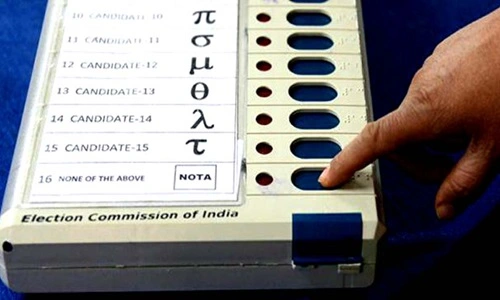Have you heard of NOTA? Well, basically, it stands for “None of the Above.” Voters in India have the option to say “no thank you” to all of the candidates running for office, you know? After getting the OK from the Supreme Court, NOTA was put into place in 2013. Its goal is to give power back to the people. To sum up, voting is still an important part of our democratic process, even if you aren’t crazy about any of the candidates.
Is that the whole point of NOTA? There’s a way for voters to express their dissatisfaction with the options provided. It’s the political equivalent of advising parties to become serious and field stronger candidates in the future. The catch is that it makes no difference who wins regardless of how many votes NOTA receives. After removing any votes marked as NOTA, the candidate with the total number of votes wins the election. Even while NOTA doesn’t change the outcome of the election, it does show that voters are unhappy. Let’s know its benefits and drawbacks:

Advantages of NOTA
1. Expression of Dissatisfaction
Without a doubt, a great way for voters to say, “None of these candidates do it for me,” is using NOTA. This changes the dynamic of democracy because it gives voice to those who feel all the candidates are missing the mark, you know, not doing good at all. Not only are voters not participating, but they are also casting doubt on the options presented to them by marking the NOTA box. The political parties may finally get the message that they need to step it up after this.
2. Pushing for Top-Notch Candidates
One of the best things about NOTA is that it encourages political parties to choose strong candidates. The candidates are falling short if the NOTA votes start piling up, and that’s a clear indicator. This may motivate parties to select candidates who are well-qualified, trustworthy, and popular with the general population, you know?
3. Boosting Voter Turnout
NOTA is also quite effective at increasing voter turnout. How exactly though? You see, these very voters who are now going for that NOTA option, well, they might have remained home if voters back then didn’t like any of the candidates. And yes, they can still participate in the electoral process without endorsing an unpopular candidate by joining NOTA. This has the potential to significantly reduce voter indifference and increase the number of ballots cast, even if it’s only to express disapproval of all the selections.
4. Keeping It Fair and Private
It has been a huge issue in Indian votes, you see, where there is a great deal of social pressure or political pressure to influence votes, NOTA is particularly important. NOTA guarantees that every voter’s vote is private and free from interference by allowing them to reject all candidates without consequences. On top of that, it conceals your voting identity, protecting you from any criticism whatsoever.
5. Ending Vote Tampering At Its Source
The fact that NOTA can be like a savior when it comes to election-tempering efforts is mind-boggling. People who are still willing to do so, find it more difficult to rig votes when voters have the option to reject all candidates. This for sure helps in maintaining the legitimacy of the entire election process, guaranteeing that the results accurately represent the will of the people rather than those manipulated by fraudsters.
Disadvantages of NOTA
1. Minimal Influence on Election Outcomes
First, let’s talk about the most important thing: how NOTA affected (or didn’t affect) the outcome of the election. You see, it makes very little difference how many NOTA votes a candidate receives in countries like India, where the candidate who receives the most votes wins. Should a sizable portion of the voters click the NOTA button, the overall score remains the same. In political fields, this reality reduces NOTA to more of a symbolic move than a genuine game-changer, you know?
2. Doesn’t Tackle the Root Problems
Although NOTA allows voters to “no thanks” to any candidate, it falls short of providing any actual remedies. Indeed, it’s a means of expressing discontent, but it doesn’t address problems including poor candidate selection or rising corruption. Critics of NOTA note that it is a rather hollow choice in electoral reform since it is excellent for highlighting issues but lacks the means to really address them.
3. Potential for Misuse
Imagine if people voted NOTA just because they weren’t invested or were influenced by shady political tactics. Under these conditions, NOTA risks losing its original meaning and becoming a tool that confuses rather than clarifies public opinion.
4. Kind Of A Thorn In The Side For Political Parties
Political parties may experience significant difficulty as a result of high NOTA vote counts. How? It’s one thing to win an election, but it’s quite another to win one in which a sizable number of the votes cast are for “none of the above.” Elected candidates may lose their credibility and administrative red tape may increase as a result, and leaders may find themselves with a weak mandate that makes it difficult to govern effectively, you know?
5. Lack of Legal Consequences
What occurs when NOTA receives a surprising number of votes? Well, there isn’t much in a lot of areas, India included. No clear legal structure exists to address the consequences of a surge of NOTA votes. All in all, to put things into perspective, you see, without clear legal consequences outlined, NOTA’s ability to usher in political change is seriously hamstrung, rendering it less effective as a tool for real reform.
Comparison Between Advantages and Disadvantages of NOTA
| Advantages | Disadvantages |
| Enables voters to express discontent with all candidates | Little effect on election results in a winner-takes-all system |
| Pressures parties to nominate qualified candidates | Highlights issues without solving underlying problems |
| Encourages voter turnout by offering a dissent option | Risks being used irresponsibly or influenced by negative tactics |
| Protects voters from social and political pressures | High NOTA votes can undermine the credibility of elected officials |
| Makes it harder to manipulate votes | Absence of legal consequences limits its effectiveness |


